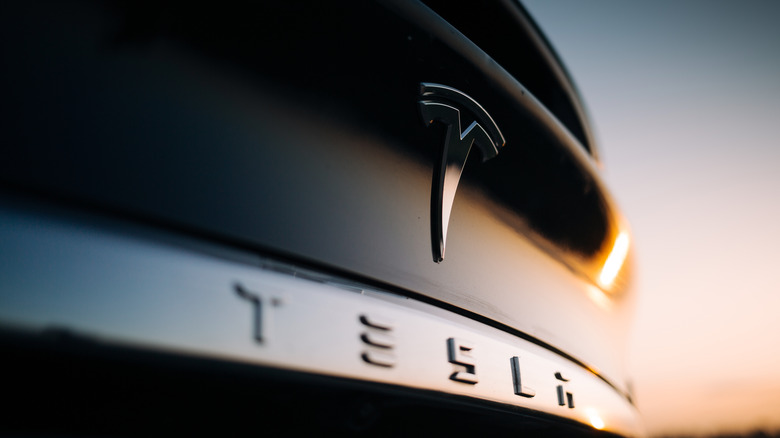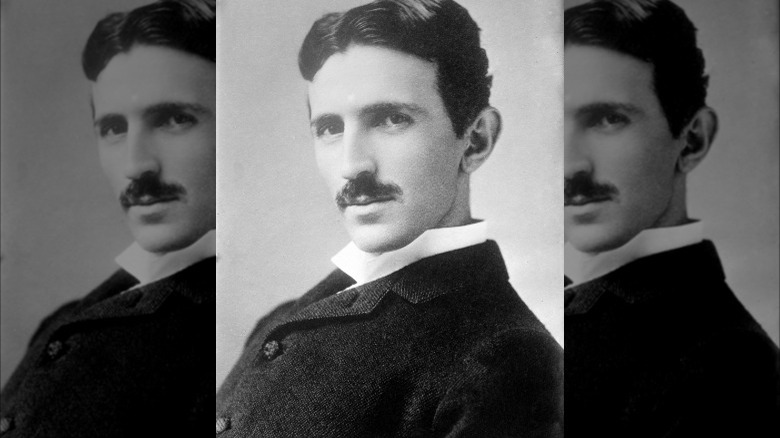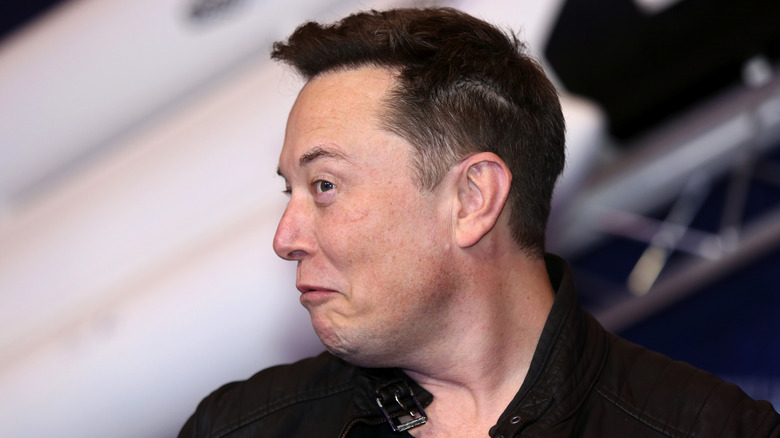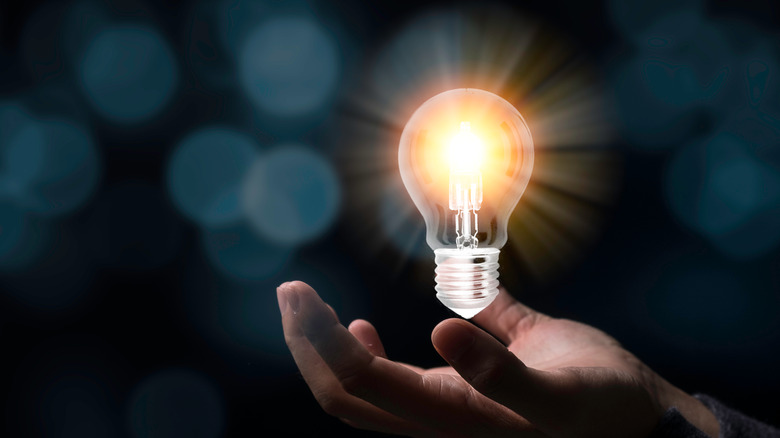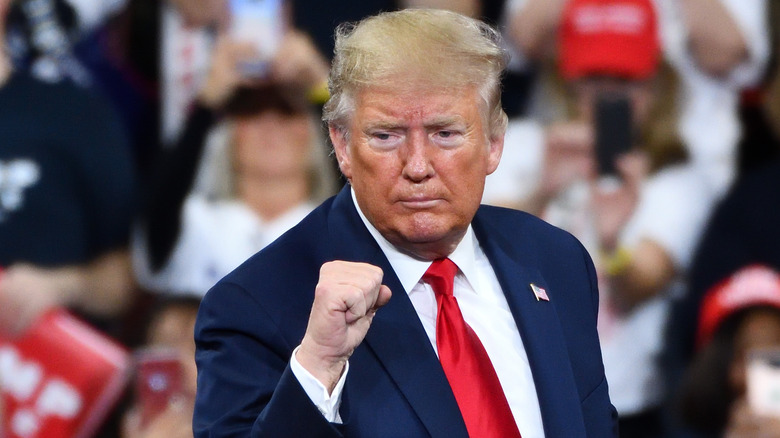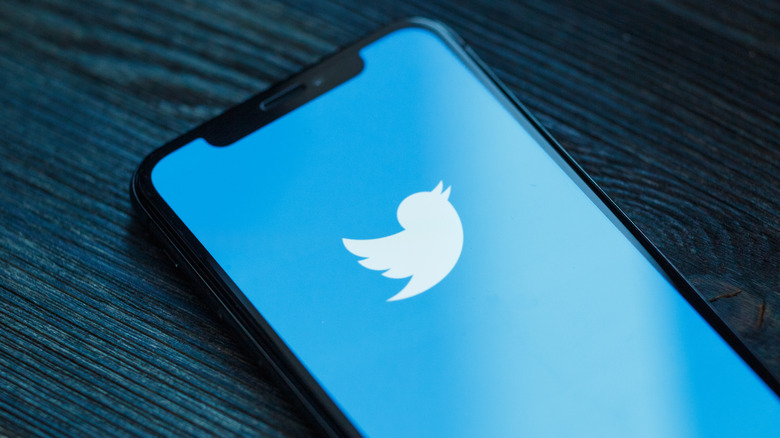The Untold Truth Of Tesla
There's plenty to criticize about Tesla Inc. (formerly Tesla Motors) — their CEO and their customers definitely have something of a reputation — but love them or hate them, it's hard to deny that, in less than 20 years, the company has accomplished what many once thought was impossible: taken the electric car from a novelty fraught with compromises to a luxury product people covet. Stretching from its ambitious 2008 debut with the Roadster — a sports car that went from 0 to 60 in 1.9 seconds — to current vehicles like the Model 3 — which, at less than $50,000, has proved a mass-market success — to promised vehicles like the DeLorean-inspired Cybertruck and an unnamed semi alleged to be, in convoy, more efficient than a train, Tesla has proved themselves to be a car manufacturer with staying power, even if they haven't always been profitable.
In 2020, Tesla rolled their millionth vehicle off the assembly line (via Electrek), making them, if nothing else, the most successful car manufacturing upstart since Chrysler in 1924 (via Green Car Reports). So, even if Tesla remains a niche product for the moment, it's not much of a stretch to say it could potentially become the fourth member of the so-called "Big Three."
In any case, it's one of the most fascinating things to happen to American cars in a long time — so let's take a closer look at the company.
Tesla's namesake was a weirdo inventor from the 19th century
Some readers will say, "Well, duh," to this one, but others may be surprised. There's no one named "Tesla" behind Tesla Inc., and neither is the word a couple of nonsense syllables. Tesla was actually named after the prototypical "mad genius." The Serbian-American inventor Nikola Tesla was something of a meme at the time the company was founded (thanks in no small part to this comic from The Oatmeal), particularly among the sort of overly-online nerds who tend to form tech companies. Tesla, in his day, was primarily known for two things: getting shortchanged and fired by Thomas Edison and slowly succumbing to OCD and dementia (via the American Association for the Advancement of Science). Despite his lousy luck, though, Tesla is generally regarded as a brilliant scientist.
Among the inventions credited to Tesla are both radar and alternating current — that is, the type of electricity that comes out of your outlets every day. (Edison strongly preferred "direct current," which is more expensive to produce and harder to deliver to consumers.)
Tesla had some ideas that proved to be a little more "out there" — like a death ray (via Science History) and the Tesla coil, which he hoped to use to deliver electricity wirelessly (via Live Science) — but many of his ideas are still used in modern technology. Unfortunately, he lacked Edison's knack for self-promotion and hoarding patents, so he died penniless (via Biography). But he's got a tech company and a metal band named after him ... so that's something. Right?
Elon Musk did not found Tesla
Flamboyant billionaire Elon Musk — last seen naming a child "X Æ A-Xii" (via CNN) — has spent the last decade working to make his name and face synonymous with the Tesla corporation, but in many ways, Musk is much more the "Edison" of Tesla than its ... well ... its Tesla.
Tesla was actually founded in 2003 by Martin Eberhard and Marc Tarpenning, who had both previously worked in the IT industry designing both hardware and software (via Britannica). By 2006, they had built the prototype for the original Roadster. Musk had entered the picture in 2004, when he came on as an investor, contributing $30 million and becoming chairman of the company.
By the time he joined Tesla, Musk had already made a decent chunk of his fortune founding online transaction facilitator PayPal, making his first billion when he and the other investors sold the company to eBay (via Biography). In 2009, both Eberhard and Tarpenning left the company. It's not clear why — mainly because both Eberhard and Tarpenning had signed non-disparagement agreements — but Tarpenning did later sue Musk for libel, slander, and breach of contract, claiming Musk had forced him out of the company. The suit was later dropped, but not before Tarpenning made it clear he was not happy about having to leave Tesla or how Musk was running it as its new CEO (via The Street).
Tesla's patents are open-source
According to The Street, when Musk took over management of the company, one of his first acts was to lay off 25% of its staff to cut costs (no doubt one of his many choices that angered Tarpenning). While Musk's bad behavior — both in and out of the boardroom — has been well-documented, though, it's to his credit that he sincerely believes in Tesla's mission to provide the world with sustainable energy. Or, at the very least, he definitely gives that impression in public.
Among other things, Musk and Tesla have made all of their patents "open-source." In a 2014 blog post, Musk announced that "Tesla will not initiate patent lawsuits against anyone who, in good faith, wants to use our technology," citing frustration that other carmakers had shown a disappointing lack of interest in competing in the e-vehicle space.
Other "good guy" moves from Elon Musk and Tesla include building "Gigafactory" manufacturing facilities that — in addition to being some of the largest buildings ever constructed (via The Street) — are designed to eventually be self-sustaining and run entirely on a mix of solar, wind, and geothermal energy (via TED).
No one's saying you need to love Tesla, though. It also made a name by engaging in arguably anti-consumer practices — for instance, in 2019, it announced they would start charging an annual fee for features that car owners had previously gotten for free, like step-by-step navigation and video streaming (via Digital Trends). You'd think dropping tens of thousands of dollars on a car would get you something, but ... well, it apparently doesn't get you that.
Elon Musk briefly served in the Trump administration
There are few people who are more larger-than-life, or more controversial, than Elon Musk, but former U.S. president Donald Trump almost certainly qualifies. Shortly before Trump's election in 2016, Musk commented that Trump wasn't "the right guy," adding, "He doesn't seem to have the sort of character that reflects well on the United States" (via Business Insider India). After Trump took office, however, Musk did what some would likely consider an about-face, agreeing to serve as an adviser to the administration and also expressing support for Trump's pick of former ExxonMobil exec Rex Tillerson as secretary of state.
When questioned about the decision, Musk told Gizmodo that he hoped that he or Tillerson could push President Trump toward investing in infrastructure and implementing a carbon tax. "This is something we need to strive for and the more voices of reason that the president hears, the better. Simply attacking him will achieve nothing. Are you aware of a single case where Trump bowed to protests or media attacks? Better that there are open channels of communication," he said.
The collaboration was not to be, however. A few months later, following Trump's announcement of the United States' withdrawal from the Paris Accords on climate change, Musk tweeted, "Am departing presidential councils. Climate change is real. Leaving Paris is not good for America or the world."
Elon Musk once almost sank the company with a tweet
Along with running Tesla — together with a handful of other companies, including NASA collaborator SpaceX and tunnel-building outfit The Boring Company — Musk has made something of a name for himself as being one of those people who tweets basically everything that pops into his head, often with disastrous results.
In 2018, e.g., Musk casually posted, "Am considering taking Tesla private at $420. Funding secured." Given his use of the number 420 (which — do we really have to explain this? — is common slang for cannabis), it's possible Musk meant the post as a joke, but the U.S. Securities and Exchange Commission (SEC) didn't see it that way. They charged Musk with fraud — alleging that the tweet had been a deliberate lie designed to drive up the company's stock price (via The Street).
The Tesla board initially tried to settle with the SEC, but reneged after Musk (allegedly) threatened to resign; unfortunately, their failure to settle sent Tesla's stock price tumbling, which forced them into a far less generous settlement than the SEC had initially offered (via Britannica). As part of the settlement, Musk agreed to step down from his chairman position (though he remains CEO) and to run all tweets by the company's lawyers (via The Verge).
That last bit was probably just as well, seeing as, at least, according to rapper Azealia Banks (via Biography), Musk had allegedly been high on LSD when he posted the tweet — a revelation that presumably surprised no one.
